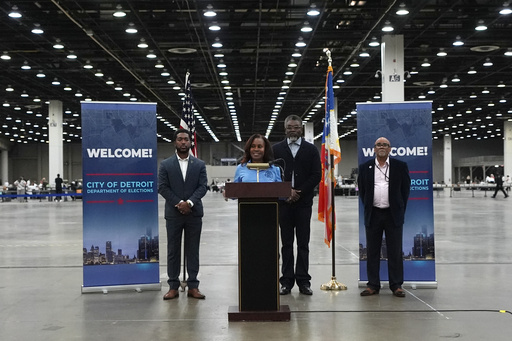
DETROIT — Four years ago, during the counting of absentee ballots inside Detroit’s downtown convention center, a group of then-President Donald Trump’s supporters assembled outside, vocalizing their discontent. Their chants and signs calling for an end to perceived electoral fraud created a tense atmosphere as they attempted to disrupt the counting process by banging on windows. In response to these events, extensive security measures have been established to prevent a similar occurrence in the upcoming elections.
Detroit City Clerk Janice Winfrey and Elections Director Daniel Baxter informed the media about the enhanced security protocols that have been developed since the tumultuous 2020 election. The environment back then was marred by a flurry of false voter fraud claims aimed at the city, leaving election officials unprepared for the hostility exhibited by some Trump supporters. “Nobody anticipated that level of disruption,” Baxter said, recounting the unprecedented challenges faced during the election, compounded by the ongoing COVID-19 pandemic and a politically divided nation. He noted, “We managed to process 174,000 absentee ballots, but we did not foresee the aggression that would unfold.”
This year, various stakeholders, including law enforcement, civil defense entities, and election administrators, have been collaborating in Pennsylvania to devise strategies for identifying and addressing election-related threats. Following a spate of false fraud allegations, Pennsylvania’s Governor Josh Shapiro established a task force to tackle the challenges emerging from the 2020 election aftermath, where lawsuits aimed at reinstating Trump were widespread.
In Cobb County, near Atlanta, local election officials coordinated training with staff and law enforcement to enhance security measures for voting personnel and ballot counting operations. In Detroit, a significant police presence was noted as Winfrey and Baxter discussed expected voter turnout, which is projected to be slightly higher than in the previous election at around 51% to 55%. They also provided insights into absentee voting and early voting.
Winfrey revealed that her office has forged partnerships with local police, the Michigan attorney general’s office, and the Justice Department to establish a “comprehensive security plan” that will be active throughout the election period. “This initiative aims to safeguard our election workers and uphold the integrity of the election process,” she explained.
To bolster security in the ballot counting area, metal detectors have been installed at entry points, and public observers, as well as media personnel, will be required to present identification for entry. Additional protective measures include bullet-resistant glass at the city’s elections headquarters, reflecting a shift in Winfrey’s perspective on security after facing personal threats from Trump supporters. “They came to my home in 2020, threatening my life because they believed I played a role in Trump’s defeat. It fundamentally changed my outlook on safety,” she shared.
Baxter pointed out that allegations of fraud targeted at cities like Detroit, known for their Democratic leanings, often stem from racial dynamics. “The persistent attacks on cities such as Philadelphia, Detroit, and Atlanta correspond to where significant Black populations reside,” he observed, noting that nearly 80% of Detroit’s residents are Black. He emphasized the systemic bias faced by administrators in predominantly Black cities which results in frequent harassment and allegations against them.
